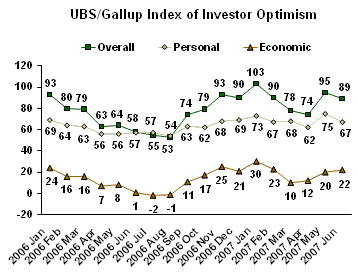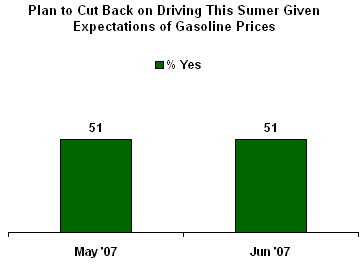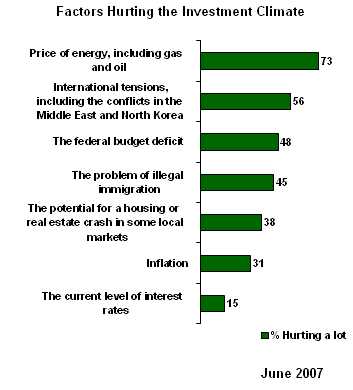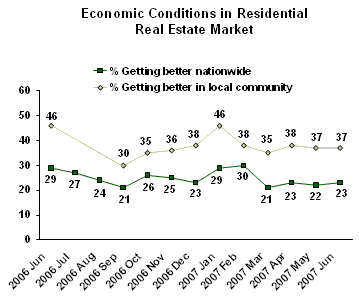GALLUP NEWS SERVICE
PRINCETON, NJ -- Investor optimism fell in June according to the latest UBS/Gallup Index of Investor Optimism. The key source of the decline is a pullback in investors' confidence about the performance of their investment portfolios from the surge in optimism of May. In sharp contrast, investor confidence in the future direction of the overall U.S. economy during the next 12 months continued to increase, building on its surge from May.
Gas prices continue to dominate investor concerns about the current investment climate. Other major worries include international tensions, federal budget deficits, and illegal immigration. And, investors still see no bottom to the current real estate recession.
Investor Optimism Declines
The Index of Investor Optimism declined by 6 points in June and now stands at 89. Despite this drop, the Index remains above its April 2007 (74) and March 2007 (78) levels and is essentially at a level last recorded in February 2007. The Index peaked in January 2000 at 178 and hit its low of 5 points in March 2003. The Index is conducted monthly and had a baseline score of 124 when it was established in October 1996.
The June decline in the Index of Investor Optimism is due to a sharp drop in investor optimism about the prospects for their investments, as the Personal Dimension of the Index decreased 8 points from 75 in May to the current score of 67. In sharp contrast, the Economic Dimension of the Index, which reflects investor optimism about the future direction of the overall U.S. economy during the next months 12 months, increased again -- up to 22 points from 20 points in May and 12 points in April.

Higher Gas Prices Worry Investors
Energy prices remain U.S. investors' top concern. Nearly three in four investors (73%) say they believe energy prices, including gas and oil, are hurting the current investment climate "a lot" -- down from 76% of investors who voiced their concerns about high energy prices in May, and essentially the same as the 72% finding in April. Still, investor energy concerns remain well above the 63% of respondents who felt this way in March and the 58% who were so concerned in February.
On average, investors report paying $3.11 for a gallon of gas during the first half of June and expect gas prices to increase to an average price of $3.27 a gallon during the next three months. Given the high prices consumers are currently paying for gas and their expectations for higher gas prices at the pump during the months ahead, it is not surprising that 51% of investors say they plan to cut back on their driving this summer. Additionally, 45% of investors say they plan to cut back on their vacation, 37% say they plan to restrict their use of air conditioning or fans, and 61% say they plan to curb other spending in general.

Investors Also Have Other Worries
International tensions are the second greatest concern of investors, with 56% of respondents pointing to international tensions as hurting the investment climate "a lot". About half of investors (48%) point to the federal budget deficit as a major concern, while 45% say the situation of illegal immigration is hurting the investment climate a lot. More than one-third of respondents (38%) say the potential for a real estate crash in some local markets is also hurting the investment climate a lot.

Most investors say they don't see the housing recession bottoming out as of June, with 71% of investors saying they believe conditions in the residential real estate market nationwide are getting worse, not better -- about the same as the 73% who felt this way in May and the 70% in April. Similarly, 58% of investors say conditions in their local community's residential real estate market are getting worse, not getting better -- a similar percentage when compared with investors' responses to this question in May (58%) and April (56%). In June, 38% of investors rate conditions in their local residential real estate market as "good" or "excellent," while 41% rate conditions as "fair" and 21% rate them as "poor" -- again, similar to ratings found in March, April, and May.

Will Financial Globalization Remain a Stealth Issue?
Most Americans are somewhat familiar with the way globalization has been impacting the U.S. economy. For example, on the negative side, they have seen factories and jobs move overseas, the U.S. auto industry steadily deteriorate, and U.S. companies purchased by overseas investors. On the positive side, they have enjoyed the lower prices associated with many imported goods and the new jobs created by U.S. exports.
Less obvious have been some of the financial market effects. For example, excessive liquidity worldwide has kept long-term interest rates artificially low and stimulated private equity purchases. Similarly, the strength of overseas economies and the ability of multinational firms to leverage their overseas operations have tended to separate the performance of U.S. equity markets from that of the U.S. economy. And then there are the artificialities in today's foreign exchange rates, which add another degree of complexity to the overall financial effects of globalization.
Some of the financial effects of globalization may become much more apparent to many Americans in the months ahead. For example, as we're just beginning to see, as worldwide interest rates increase, U.S. interest rates will be affected, particularly long-term rates. This could add to the woes of the current real estate markets at a time when they clearly don't need any additional challenges. It could also reduce the Federal Reserve's flexibility going forward.
Significantly, current interest rate levels seem to be something of a stealth issue as far as U.S. investors are concerned. Just 15% of investors say that current the state of interest rates are hurting the investment climate a lot -- rates are simply not among their top worries. Of course, rates will get more attention during the week ahead as the Federal Open Market Committee (FOMC) meets to discuss its policies. Still, if the past is any indication, the impact of globalization on U.S. interest rates remains an issue whose time is yet to come.
Survey Methods
Investor results are based on telephone interviews with 805 investors, aged 18 and older, conducted June 1-17, 2007. For results based on the total sample of investors, one can say with 95% confidence that the maximum margin of sampling error is ± 4 percentage points. In addition to sampling error, question wording and practical difficulties in conducting surveys can introduce error or bias into the findings of public opinion polls.